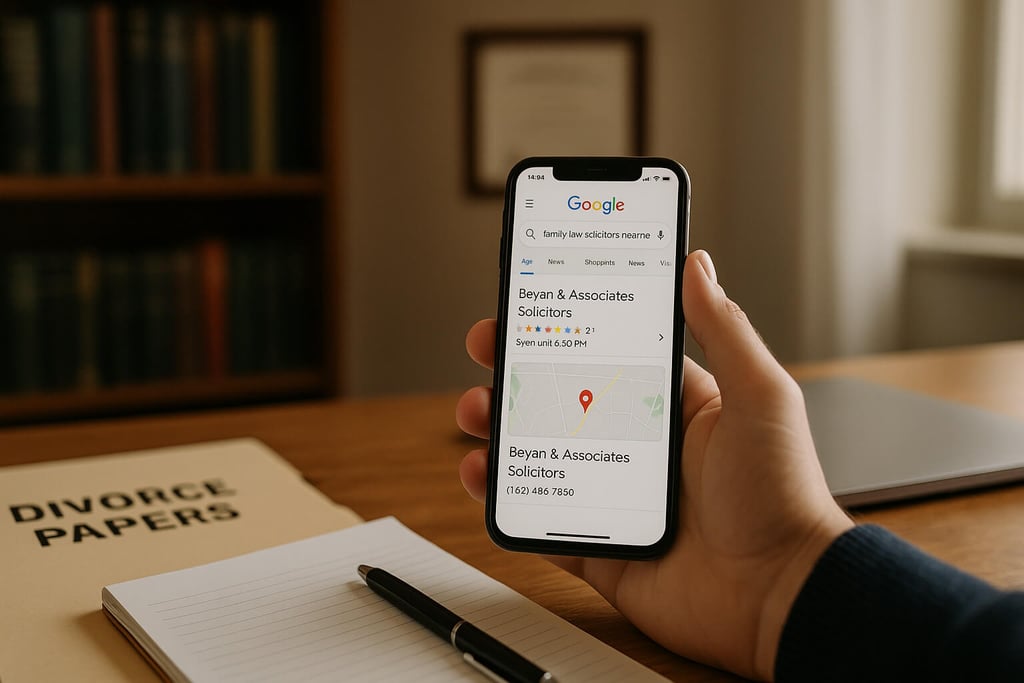SEOJet Flight Blog
SEO for Solicitors: Law Firm Search Engine Optimisation Guide
Your SEO guide for solicitors: Improve search results & attract potential clients. Learn law firm SEO tips to rank higher on search engines.
SEO FOR LOCAL COMPANIES
Ardene Stoneman
5/17/20255 min read


SEO for Solicitors: A Practical Guide for Law Firms
Search engine optimisation (SEO) is essential for any law firm aiming to attract more clients online.
Whether you're a small solicitor's practice or a larger legal firm, the right SEO strategies can improve your visibility and help you compete.
This guide explains how solicitors and law firms can approach SEO in a practical way, what to focus on, and why it's worth the effort.
Outline
Why do law firms need SEO?
How do people search for solicitors?
What makes a good law firm website?
What is on-page SEO and why does it matter?
How does technical SEO affect your rankings?
What is local SEO for solicitors?
Should law firms use Google My Business and legal directories?
What are off-page SEO activities for a law firm?
How can you track SEO performance?
Should you hire an SEO agency or go in-house?
1. Why do law firms need SEO?
Every law firm needs a steady stream of new enquiries to grow. With more people using search engines like Google to find legal services, having a strong online presence is no longer optional.
If your law firm doesn’t appear near the top of search results, you're losing potential clients to competitors who do. This is where SEO comes in.
SEO is the process of making your law firm's website more likely to appear when people search for solicitors near them or specific legal services.
Search engine optimisation helps law firms improve their organic traffic, which means more people visiting your website without paid adverts.
Done well, SEO will help your law firm attract the right kind of attention online.
2. How do people search for solicitors?
Understanding how people search for legal help is vital. Most searches are based on location and need. Phrases like "family law solicitors in London" or "injury solicitors near me" are common.
People search for solicitors using terms related to:
Area of law (e.g. commercial law, family law)
Location (e.g. solicitors in 2025 trends show more localised searches)
Reputation (e.g. best rated, reviews, law society members)
This behaviour makes it clear why SEO for solicitors must focus on matching the services you offer with what potential clients are actually typing into search engines.
3. What makes a good law firm website?
A law firm’s website is often the first impression someone has of your business. It needs to be clear, trustworthy, and easy to navigate. But it also needs to help search engines understand what you offer.
A good law firm website should:
Clearly list your legal services
Include pages for each area (e.g. family law, commercial law)
Load quickly and work well on phones
Include your firm’s contact details in the footer and on a contact page
The law firm’s SEO also benefits from strong internal linking and clear page titles. A professional layout can support your SEO efforts by reducing bounce rates and keeping visitors engaged.
4. What is on-page SEO and why does it matter?
On-page SEO includes all the content and formatting decisions made directly on your law firm website. This part of SEO includes:
Page titles and meta descriptions
Heading structure (H1, H2 etc.)
Keywords relevant to the legal services you offer
Images with appropriate file names and alt text
For example, a family law page should include the term “family law” a few times in natural language. Don’t overdo it. A well-written page that answers common questions about divorce, custody, or separation will work better than one packed with repeated keywords.
Good on-page SEO helps law firms match what people are searching for and allows search engines to correctly list your pages.
5. How does technical SEO affect your rankings?
Technical SEO focuses on how well your law firm's website works behind the scenes. You can have great content, but if search engines can’t read or access your site properly, you won’t rank well.
Things that matter for technical SEO:
Mobile-friendliness
Site speed
Secure connection (HTTPS)
Clear page structure with no broken links
An SEO audit can help spot technical problems. It’s worth fixing them early because search engines like Google care about user experience.
6. What is local SEO for solicitors?
Local SEO is essential if you want your law firm to appear in search results when someone searches for solicitors near them. This is especially important for family law, personal injury, or other services where people want someone nearby.
Steps to improve local SEO:
Add your firm to Google Business Profile
Use consistent name, address, and phone number across the web
Add location-based keywords like "solicitors in Bristol" to key pages
Local SEO for solicitors helps you attract clients who are nearby and ready to get in touch. It’s one of the best ways to improve local search visibility.
7. Should law firms use Google My Business and legal directories?
Yes. Google My Business (now called Google Business Profile) is essential for local SEO. It puts your law firm on the map, literally. You can appear in the map pack for location searches.
Benefits of Google Business Profile:
Lets people find you through maps
Shows reviews and ratings
Displays opening hours and contact details
Legal directories also help. Being listed in reputable legal directories boosts your law firm’s trust and can bring in referral traffic. This also contributes to your off-page SEO.
8. What are off-page SEO activities for a law firm?
Off-page SEO means any SEO work that happens away from your law firm’s website. It helps build your site’s reputation and authority in the eyes of search engines.
Examples include:
Backlinks from other trusted websites
Mentions in articles or local press
Directory listings
Client reviews
Off-page SEO helps law firms compete with others in the same area by showing Google that you are a known and reliable source of legal services.
9. How can you track SEO performance?
Measuring your SEO success is key to knowing what works. You don’t need to be a specialist to track some basics.
Key SEO metrics to watch:
Organic traffic (visits from search engines)
Keyword rankings
Number of enquiries or calls from your website
Bounce rate and time on page
You can use free tools like Google Search Console or Google Analytics. A proper SEO campaign should include regular checks to ensure your law firm SEO strategy is delivering results.
10. Should you hire an SEO agency or go in-house?
This depends on your law firm’s size and resources. Some larger legal firms have digital marketing teams in-house. Smaller practices often find it more cost-effective to work with an SEO agency.
What matters most is that whoever handles your SEO knows:
How solicitors and law firms operate
What potential clients are looking for
The right SEO practices for the legal industry
If you do choose to hire an SEO agency, look for one that offers SEO services for solicitors and has a track record with legal SEO. Make sure they’re realistic about results and provide regular updates.
Summary: What Solicitors Need to Know About SEO
Law firms need SEO to compete online and attract potential clients.
Most people use search engines to find solicitors and law firms.
A well-built law firm website is vital for both users and search engines.
On-page and technical SEO must work together for best results.
Local SEO helps you appear in searches for solicitors near your office.
Google Business Profile and legal directories support visibility.
Off-page SEO builds authority through links and mentions.
Measure performance with tools like Google Analytics and Search Console.
Choose between in-house SEO or an agency based on your capacity.
If you’re a law firm looking to make SEO work for your business, SEOJet can help. We offer honest advice and hands-on SEO services built around the needs of solicitors and legal practices across the UK.
Services
Contact Us
Newsletter Signup
sales@seojet.co.uk
01934 289 404
© 2025. All rights reserved.


Locations
Weston-super-Mare
Somerset
Bristol
9am - 6pm, Monday to Friday
Suite 2, Unit 7, 12 Beaufigter Rd, Weston-super-Mare, BS24 8EE
